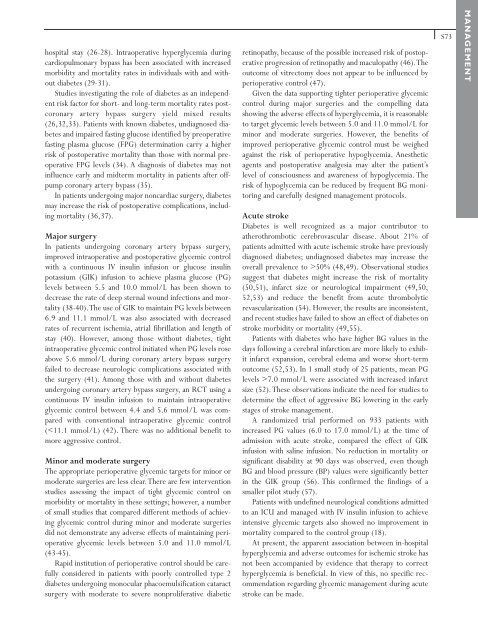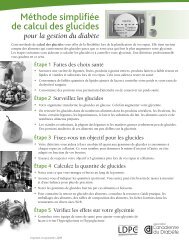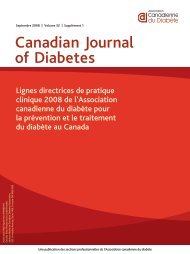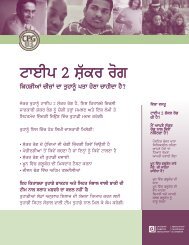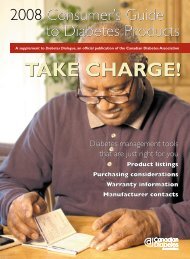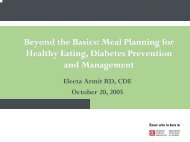2008 Clinical Practice Guidelines - Canadian Diabetes Association
2008 Clinical Practice Guidelines - Canadian Diabetes Association
2008 Clinical Practice Guidelines - Canadian Diabetes Association
Create successful ePaper yourself
Turn your PDF publications into a flip-book with our unique Google optimized e-Paper software.
hospital stay (26-28). Intraoperative hyperglycemia during<br />
cardiopulmonary bypass has been associated with increased<br />
morbidity and mortality rates in individuals with and without<br />
diabetes (29-31).<br />
Studies investigating the role of diabetes as an independent<br />
risk factor for short- and long-term mortality rates postcoronary<br />
artery bypass surgery yield mixed results<br />
(26,32,33). Patients with known diabetes, undiagnosed diabetes<br />
and impaired fasting glucose identified by preoperative<br />
fasting plasma glucose (FPG) determination carry a higher<br />
risk of postoperative mortality than those with normal preoperative<br />
FPG levels (34). A diagnosis of diabetes may not<br />
influence early and midterm mortality in patients after offpump<br />
coronary artery bypass (35).<br />
In patients undergoing major noncardiac surgery, diabetes<br />
may increase the risk of postoperative complications, including<br />
mortality (36,37).<br />
Major surgery<br />
In patients undergoing coronary artery bypass surgery,<br />
improved intraoperative and postoperative glycemic control<br />
with a continuous IV insulin infusion or glucose insulin<br />
potassium (GIK) infusion to achieve plasma glucose (PG)<br />
levels between 5.5 and 10.0 mmol/L has been shown to<br />
decrease the rate of deep sternal wound infections and mortality<br />
(38-40).The use of GIK to maintain PG levels between<br />
6.9 and 11.1 mmol/L was also associated with decreased<br />
rates of recurrent ischemia, atrial fibrillation and length of<br />
stay (40). However, among those without diabetes, tight<br />
intraoperative glycemic control initiated when PG levels rose<br />
above 5.6 mmol/L during coronary artery bypass surgery<br />
failed to decrease neurologic complications associated with<br />
the surgery (41). Among those with and without diabetes<br />
undergoing coronary artery bypass surgery, an RCT using a<br />
continuous IV insulin infusion to maintain intraoperative<br />
glycemic control between 4.4 and 5.6 mmol/L was compared<br />
with conventional intraoperative glycemic control<br />
(50% (48,49). Observational studies<br />
suggest that diabetes might increase the risk of mortality<br />
(50,51), infarct size or neurological impairment (49,50,<br />
52,53) and reduce the benefit from acute thrombolytic<br />
revascularization (54). However, the results are inconsistent,<br />
and recent studies have failed to show an effect of diabetes on<br />
stroke morbidity or mortality (49,55).<br />
Patients with diabetes who have higher BG values in the<br />
days following a cerebral infarction are more likely to exhibit<br />
infarct expansion, cerebral edema and worse short-term<br />
outcome (52,53). In 1 small study of 25 patients, mean PG<br />
levels >7.0 mmol/L were associated with increased infarct<br />
size (52).These observations indicate the need for studies to<br />
determine the effect of aggressive BG lowering in the early<br />
stages of stroke management.<br />
A randomized trial performed on 933 patients with<br />
increased PG values (6.0 to 17.0 mmol/L) at the time of<br />
admission with acute stroke, compared the effect of GIK<br />
infusion with saline infusion. No reduction in mortality or<br />
significant disability at 90 days was observed, even though<br />
BG and blood pressure (BP) values were significantly better<br />
in the GIK group (56). This confirmed the findings of a<br />
smaller pilot study (57).<br />
Patients with undefined neurological conditions admitted<br />
to an ICU and managed with IV insulin infusion to achieve<br />
intensive glycemic targets also showed no improvement in<br />
mortality compared to the control group (18).<br />
At present, the apparent association between in-hospital<br />
hyperglycemia and adverse outcomes for ischemic stroke has<br />
not been accompanied by evidence that therapy to correct<br />
hyperglycemia is beneficial. In view of this, no specific recommendation<br />
regarding glycemic management during acute<br />
stroke can be made.<br />
S73<br />
MANAGEMENT


